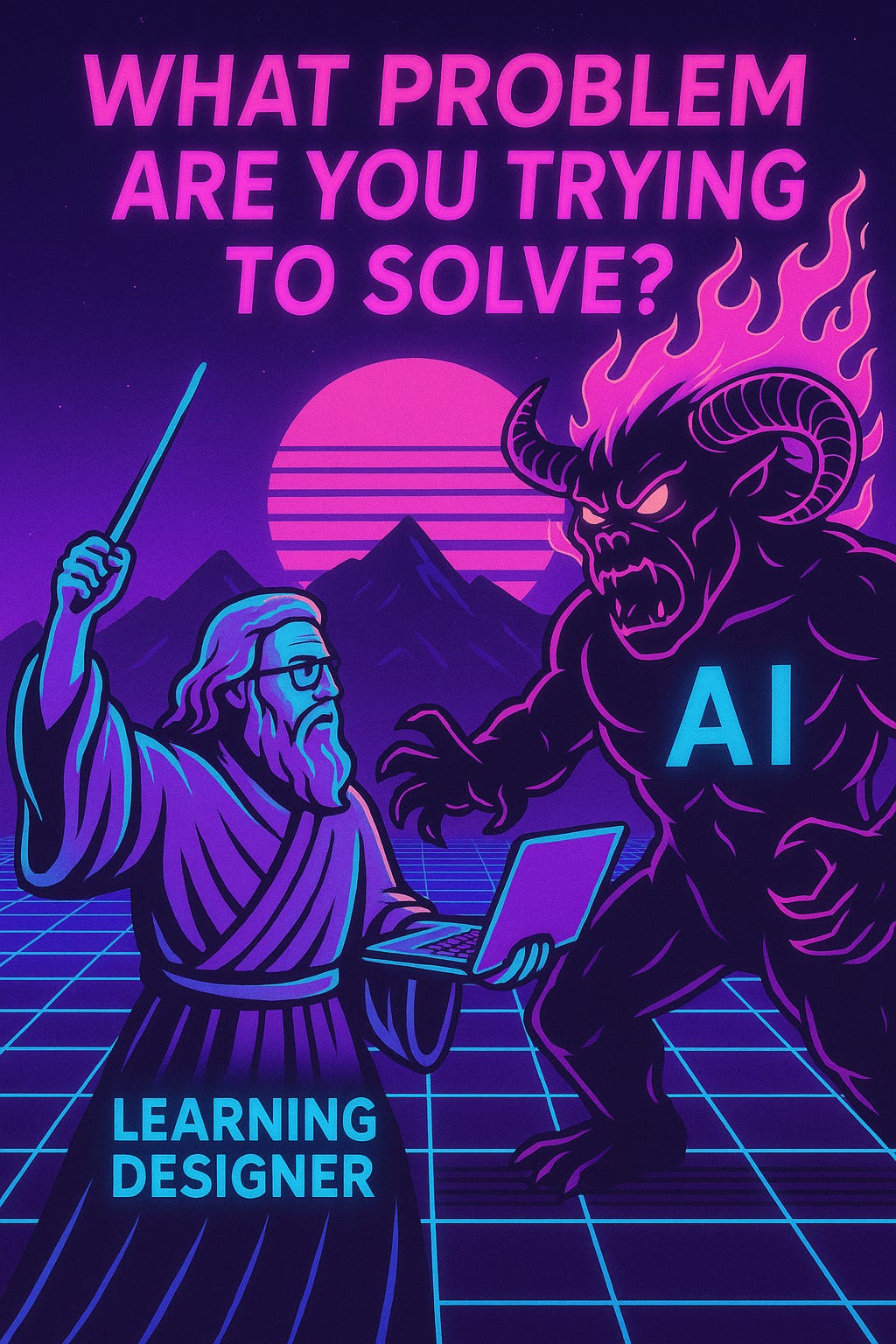Why organizations still need learning designers
Friction is a feature of LXD, not a bug.
Over the last six months, I’ve had conversations with a number of industry colleagues about the future of learning design.
While opinions on the topic vary, there’s broad consensus that AI has propelled the profession into a state of flux.
In a recent Dispatch, I made the argument that the job of learning designers is not to create content, but to change behavior.
This was true long before ChatGPT was even a glint in Sam Altman’s eyes.
But the rise of AI has thrown that reality into sharper relief.
Of course, some people will argue that AI tools churn out generic, anaemic prose, and that your average LXD could still beat an LLM in a script-off.
Maybe.
The difference, though, is that the LLM finished its draft before the LXD even got out of bed.
It also didn’t ask any of those pesky consulting questions.
This, fundamentally, is the value proposition of many AI-powered authoring tools: frictionless learning design and development.
In many cases, these tools are even pitched as a means of cutting learning designers out of the loop entirely — ‘Just give your SMEs access, feed in your policy docs, and AI will do the rest! Bish, bash, bosh!’.
There’s obvious appeal in that message. For SMEs who are juggling multiple, competing priorities, consulting with a learning designer is necessarily accompanied by a degree of friction.
But that friction is a feature, not a bug.
When you know designing a 20-minute e-learning module will take a meaningful amount of time and money, the question is: ‘Why should we do this?’.
If AI eventually drives the cost of learning design to zero, the question becomes ‘Why not?’.
This isn’t to say that L&D shouldn’t be looking for opportunities to use AI to reduce friction in the learning-design process. But organizations should be wary of removing that friction entirely.
If they’re not, they’ll likely end up with e-learning modules that could have been one-page PDFs, bloated systems that make it harder for people to find what they need when they need it, and an L&D department that might tick a box but doesn’t change behavior.
And even if ticking a box is the desired outcome, it’s reasonable to ask how regulators would respond to an AI-generated course when assessing compliance…
Like Gandalf on The Bridge of Khazad-dûm, learning designers stand between organizations and the learning slop abyss.
Except, instead of ‘You shall not pass!’, it’s ‘What problem are you trying to solve?’.
Want to share your thoughts on the future of learning design? Then get in touch by emailing custom@mindtools.com or reply to this newsletter from your inbox.
🎧 On the podcast
Last week on the Mindtools L&D Podcast, we decided to revisit our 2021 ‘documentary special’ on product management.
This episode took a lot more work to produce than our usual roundtable format, but we think it paid off. 😉
Featuring contributions from Myles Runham, Sukh Pabial, Danny Seals, and Gemma Paterson, we discussed:
what product management is;
what L&D can learn from product management;
what ‘the product’ is in the context of L&D.
Check out the episode below. 👇
You can subscribe to the podcast on iTunes, Spotify or the podcast page of our website.
📖 Deep dive
As you may have gathered from the start of today’s newsletter, I’m slightly skeptical of the notion that the average LXD is necessarily a better writer than an LLM like ChatGPT, Claude or Gemini.
A learning designer may be better than AI in certain respects (creativity, originality) and worse in others (grammar, consistency, etc.).
So, how do you decide whether or not to delegate a writing task to AI?
For organizations and individuals, one of the challenges of implementing AI tools successfully is what researchers refer to as ‘algorithm aversion’, which describes humans’ resistance to algorithm-based decision tools.
In a recent study, researchers found that when participants were rewarded for good performance, they preferred human judgement over AI.
But when the same task was reframed around losses (participants lost money for poor performance), the preference disappeared. Under loss framing, participants delegated just as often to the AI as to the human.
The researchers suggest that this is because loss framing heightens ‘situational awareness’.
When the potential for loss is made salient, people think more carefully about the task and its demands, and become less driven by instinctive bias against algorithms.
Bockstedt, J. & Buckman , J. (2025) ‘Humans’ Use of AI Assistance: The Effect of Loss Aversion on Willingness to Delegate Decisions’. Management Science
👹 Missing links
Could you go two whole days without AI? Not just generative AI (ChatGPT, etc.), but any kind of artificial intelligence, including machine learning? This is the experiment that A.J. Jacobs undertook for a recent piece in the New York Times. What he found was that, while generative AI still feels relatively new, other types of AI have been with us for some time. From obvious examples, like using facial recognition to unlock our phones, to less obvious ones, like the ways AI is used to manage water in reservoirs, the article explores how AI has become deeply embedded in modern life.
🥵 I loved my time in the UK. But it needs an AC intervention.
As a Brit married to an American, I’ve always had a different take on air conditioning than my wife. My perspective is that it’s so rarely ‘hot’ in the UK that the cost, both financial and environmental, just isn’t worth it. Most of the time, opening a window in our Edinburgh flat will get the job done. In this newsletter, Eli McKown-Dawson takes the other side of the argument, highlighting the increasing prevalence of heatwaves in Europe, and the many costs we pay by failing to cool our homes.
🎛️ A breath of fresh air with Brian Eno
A few throwaway lines in this episode of The Ezra Klein Show are partly responsible for the focus of today’s Dispatch: ‘What seems to have happened in the race for profits is we’ve managed to sidestep the friction that normally comes with things being born into the world. Friction is very important. Friction gives you a little time to see what’s happening.’. Whether you’re a fan of Brian Eno’s music or not, I found a lot of value in this conversation.
👋 And finally…
If you had one shot, would you capture it?
👍 Thanks!
Thanks for reading The L&D Dispatch from Mind Tools! If you’d like to speak to us, work with us, or make a suggestion, you can email custom@mindtools.com.
Or just hit reply to this email!
Hey here’s a thing! If you’ve reached all the way to the end of this newsletter, then you must really love it!
Why not share that love by hitting the button below, or just forward it to a friend?



